Nicaraguans fear return to civil war past
Parents seem apprehensive about the lives of their children
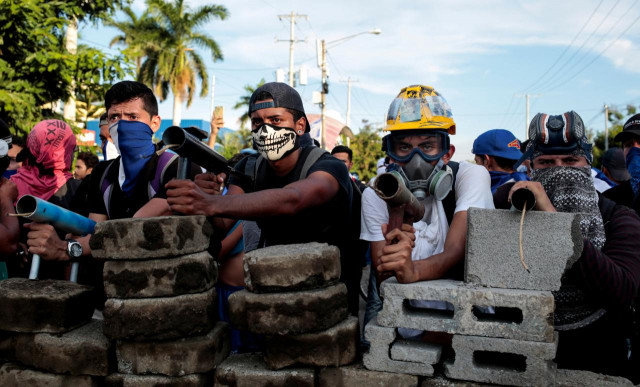
PHOTO: REUTERS
He lost comrades and a leg after he was hit by a grenade fired from a rocket-propelled launcher. But nothing during a decade-long war prepared him for the pain caused by the death of his son in April, three days after protests broke out against the leader of that revolution, President Daniel Ortega.
They started out of anger over planned pension reforms but since then the protests have mushroomed into a broad campaign against Ortega himself, who is accused of acting like a dictator. Some 250 people have been killed in violence that has sparked fears of a return to the dark days of the 1970s and 80s.
Violence flares up in Nicaragua after suspension of peace talks
Among the victims was Gomez's 23-year-old son, also named Alvaro.
"I've been told that they grabbed him, beat him and shot him in the chest. He was already dead when they arrested him," Gomez told AFP as his voice cracked.
"It was the police. When I was told, it didn't affect me because I thought my son was at work. I went to the morgue to see. It was him."
His son worked in a factory and was studying finance. He died at a barricade near his home in Monimbo, a suburb of the opposition stronghold of Masaya.
Anti-government protesters set up barricades all across the country but armed forces and hooded pro-government paramilitaries, backed by snipers, were sent in to clear the barricades and break-up protests, resulting in a heavy death toll.
Monimbo is one area where the protesters have held firm and the barricades remain, though the local community is practically besieged.
One notice near Gomez's house, placed by hooded protesters, informs people that "the trenches close at 6pm."
Monimbo was once a hotbed of the Sandinista National Liberation Front resistence movement that ousted the US-backed dictator Anastasio Somoza in 1979, resulting in Ortega assuming power.
Almost 40 years on, revolutionary sentiments remain strong in the area but Ortega - who served from 1979 to 1990, and was re-elected president in 2007 and has been in power ever since - is now public enemy number one.
"There's a lot of fear that history is repeating itself. It's demoralising," sociologist Adriana Trillos told AFP.
"People are expressing fear related to the existing danger, but also of a return to the situation that caused so much trauma during the war."
Sitting in his sweaty front room, 48-year-old mathematics teacher Gomez reflects on how the revolutionary fight served not to oust a dictator but, he says, merely replace one with another.
"The Ortega-Murillo family is doing the same as Somoza," he said, referring to Vice President Rosario Murillo, Ortega's wife.
The Somoza family created a dynasty that ruled Nicaragua for 43 years.
"I get so angry because we're fighting for the revolution - while they give the order to kill the children and grandchildren of those who carried Daniel to power in 1979 and fought to keep him there."
The Nicaraguan revolution didn't end with the exile of Somoza, who was later assassinated in Paraguay, as Sandinistas spent a decade battling US-backed right-wing counter-revolutionaries known as the Contras.
"I'm crippled from the war and I feel useless," said Gomez, who described himself as a Sandinista "not a Danielista and even less a Murillista".
"Since my son's death I've felt powerless and courageous in seeing so many deaths and not being able to do anything in such an imbalanced war.
"They (Ortega's forces) have weapons; the youngsters have stones and cement."
The feeling of the past coming back to haunt the present is palpable in Monimbo.
Angela Aleman, 69, says her mother was shot and several relatives imprisoned and tortured by Somoza during the war.
"Now I live with fear as my children are in the trenches," she said.
Trillo says Nicaraguans are suffering from "clear symptoms of post-traumatic stress" such as insomnia, nightmares, hypersensitivity, evasion and fear that weren't treated after the war and have led to an "exodus" in recent weeks.
There is alarm that the country might descend into a repeat of the "disappearances, arbitrary imprisonment, torture and that children disappear only to reappear dead," that marked the Somoza dynasty, said the sociologist.
Three dead in Nicaragua clashes as US slaps sanctions on government
Gomez for one is already tormented by his nightmares. "I dream about my son: I see him at work, I see him studying, I want to see him get married, have a family, but this government..." he said, unable to finish his sentence, consumed by pain.
He sees himself ringing his son, talking to him, listening to him, visiting him at his home 200 meters away. He sees them walking together - him with difficulty - through his beloved cobbled streets of Monimbo.
At times he sits silently, tears and sweat trickling down his cheeks, a blackboard visible over his shoulder with square root calculations chalked on it that he teaches to local children he hopes will one day live a future free of fear and suffering.

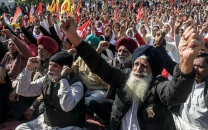
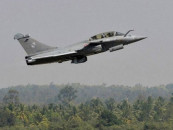
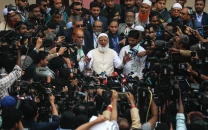

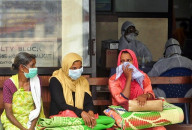
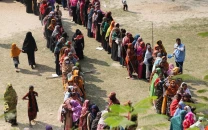












COMMENTS
Comments are moderated and generally will be posted if they are on-topic and not abusive.
For more information, please see our Comments FAQ